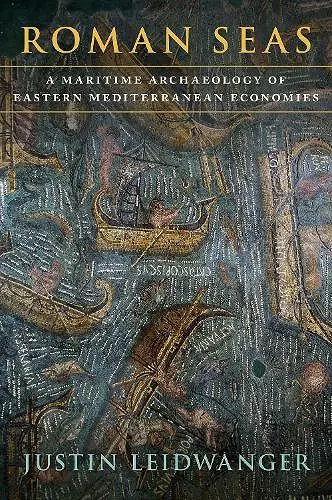Roman Seas
A Maritime Archaeology of Eastern Mediterranean Economies
Format:Hardback
Publisher:Oxford University Press Inc
Published:16th Jun '20
Currently unavailable, and unfortunately no date known when it will be back

That seafaring was fundamental to Roman prosperity in the eastern Mediterranean is beyond doubt, but a tendency by scholars to focus on the grandest long-distance movements between major cities has obscured the finer and varied contours of maritime interaction. This book offers a nuanced archaeological analysis of maritime economy and connectivity in the Roman east. Drawing together maritime landscape studies and network analysis, Roman Seas takes a bottom-up view of the diverse socioeconomic conditions and seafaring logistics that generated multiple structures and scales of interaction. The material record of shipwrecks and ports along a vital corridor from the southeast Aegean across the northeast Mediterranean provides a case study of regional exchange and communication based on routine sails between simple coastal harbors. Rather than a single well-integrated and persistent Mediterranean network, multiple discrete and evolving regional and interregional systems emerge. This analysis sheds light on the cadence of economic life along the coast, the development of market institutions, and the regional continuities that underpinned integration-despite imperial fragmentation-between the second century BCE and the seventh century CE. Roman Seas advances a new approach to the synthesis of shipwreck and other maritime archaeological and historical economic data, as well as a path through the stark dichotomies-either big commercial voyages or small-scale cabotage-that inform most paradigms of Roman connectivity and trade. The result is a unique perspective on ancient Mediterranean trade, seafaring, cultural interaction, and coastal life.
This volume takes a broad view of the intersection of maritime activities with the socioeconomic development of the Mediterranean world. Focusing on evidence from the Roman and late antique eastern Mediterranean, with particular attention to the area of southwestern Turkey and southern Cyprus from the second century BCE to the seventh century CE, Leidwanger presents an economic history intrinsically connected to the dynamic maritime world. * Alexandra Ratzlaff, Department of Department of Classical Studies Brandeis University, Mandel Center for the Humanities, Studies,, Journal of Eastern Mediterranean Archaeology and Heritage Studies *
[Lediwanger's] innovative research represents a most welcome contribution to the analysis of the ancient Roman economy, which will certainly spark a rich debate. * Journal of Roman Studies *
With this book the author admirably masters a first deep insight into the complex world of Mediterranean economies. With the archaeological records indicating a diverse relationship and interdependency between economic networks and environmental, social and political impacts, a highly difficult task has been undertaken, especially for Late Antiquity. * Journal of Maritime Archaeology *
This publication provides a refreshing approach in the study of maritime economic networks in the Roman Mediterranean.... This book represents an important contribution to the study of ancient maritime economies through its measured and clear methodological approach.... The book should be considered as a core piece of literature in the field and will stand out as a reflection of the promise and potential in the application of network analysis on a regional scale using multiple lines of data. * International Journal of Nautical Archaeology *
This volume represents an important move forward in our understanding of how multiscalar connectivity influenced not only maritime trade but the Roman economy itself. This comprehensive research provides a valuable model for future regional studies. * Journal of Eastern Mediterranean Archeology and Heritage Studies *
[Leidwanger] contributes to a new generation of scholarship on connectivity.... Through his case studies, he convincingly demonstrates that the key for understanding the dynamics of complex maritime networks is from the bottom up. * American Journal of Archaeology *
There is no doubt that the application of network analysis in maritime archaeology is an inspiring exercise and that this book has opened promising paths in this direction. This is true not only for those interested in exploring new approaches to old data but also for anyone who cares for a fresh view and more voyages across periods, in different corners of the maritime Mediterranean and beyond. * Journal of Roman Archaeology *
This book is a vital and worthy addition for any reader who is fascinated by the Roman Empire, ancient trade and marine archaeology. * Global Maritime History *
This is an insightful work that encourages useful discussions that wed economics, change, space, and perceptions of space, precisely because what is done here could inform related discussions in biblical studies. * David Schreiner, Reviews in Biblical Literature *
A hugely important third volume... the author provides a masterful synthesis of 'Roman and late antique shipwrecks from southwest Turkey and the northeast Mediterranean' * Michael Squire, Greece & Rome *
Archaeologists and historians looking to undertake such studies would be hard pressed to find a better model for their research than this monograph. * Ruben Post, University of St Andrews, Bryn Mawr Classical Review *
ISBN: 9780190083656
Dimensions: 155mm x 236mm x 25mm
Weight: 612g
336 pages